What Careers Are Safe From Automation And The Robot Takeover?
Dire warnings about an impending robot takeover of human jobs continue to multiply across the mediascape. Some of it reads like bad science fiction, but there are demonstrable indicators that highlight how automation already has rendered human labor a more costly, less-efficient means of production in a number of sectors.
In the graphic below we can see the effect this already is having on factory workers.
The world’s largest electronics manufacturer, Foxconn, has gone so far as to develop a three-phase plan for near-total conversion of its massive human workforce to Foxbots.
The rise of autonomous vehicles and drones are set to render nearly all drivers and delivery personnel obsolete, while robot security guards, police bots, robotic bartenders, cooks, agricultural robots, and even robot infantry are slated to push all of these frontline occupations into obscurity.
However, when we speak about automation, it is more than the replacement of physical tasks. Artificial intelligence enables the automation of non-physical lines of work as well.
You will see in the next graph that one of the top risks has nothing to do with physical labor, but appears in the insurance sector.
Many people who are currently in middle management positions or jobs that require a high level of education might believe that they will be impervious to replacement, but it would be unwise to look at the current trend of replacing predominantly low-skill, low-paying jobs and conclude that it will not expand up the ladder.
Jobs all across the business and finance landscape will be heavily affected in the manner of insurance underwriters: book keepers, accountants, auditors, loan officers, tellers, clerks, and postal service workers will easily be replaced by artificial intelligence. The legal profession is another highly populated sector that will have a difficult time as the need for secretaries, paralegals and court reporters will decline.
And if experts are correct in their projections, the very top business leaders might not be immune either. Jack Ma from Alibaba, recently said that CEOs themselves could be on the chopping block, going so far as to predict that "In 30 years, a robot will likely be on the cover of Time Magazine as the best CEO." Ma paints a bleak picture of what the three transitional decades could look like for those who are “unprepared for the upheaval technology is set to bring.” Ma believes that we still have 5-10 years before we reach the most critical levels of unemployment created by automation.
The following two charts illustrate the massive impact that this “Fourth Industrial Revolution” is expected to have in both the developing and developed world as the conversion to robots and artificial intelligence accelerates across the planet.
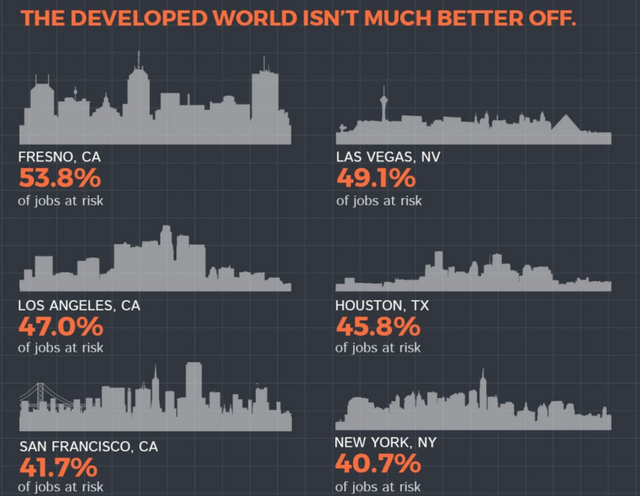
Images: Futurism
Naturally, governments around the world are heeding a potential worst-case scenario and are devising their own solutions, one of which is the revival of the idea to have a Universal Basic Income that will guarantee some nominal payment for one’s existence. As with nearly all government solutions, this one very well could wind up creating a cascade of more problems in its wake. It also further diminishes the role of human ambition and independence, while assigning some sort of baseline value for human life.
Some manufacturing companies are trying to maintain a human workforce through the introduction of physical and mental enhancements. Perhaps this could be a valid stop-gap measure to minimize an adversarial relationship to automation, and instead seek a collaborative one. However, it remains to be seen how people will embrace what could be perceived as the first step toward becoming a cyborg. These augmented workers are being referred to as Operator 4.0 and would possess the following characteristics
Super Strong – In factories, warehouses and on construction sites, workers outfitted with exoskeletons could offer more flexibility while enjoying enhanced strength to perform current tasks that are a severe risk to worker health.
Super Informed – Utilizing smart glasses, for example, workers can be given information at a much faster rate, thus avoiding research downtime, lengthy training sessions, and time-consuming group strategy and design meetings. Real-time communication between employers and workers on and off site will enable unprecedented collaboration and efficiency.
It would be wise to read these signposts as they now stand and begin as soon as possible to evaluate the best ways to use technology to our benefit – or sidestep it if need be – so that we don’t find ourselves outsourced, turned into cyborgs, or left purely to the mercy of government intervention.
We first need to identify what makes us uniquely human so that we can survive a career takeover and best position ourselves to financially thrive on the other side this revolution in technology.
An excellent resource is available which evaluates the percentage chance of your job being outsourced to robots and artificial intelligence. More so than the specific jobs themselves, which you can input and obtain the results of here, along with the full 72-page free report, one should notice the general human elements that appear across seemingly disparate occupations. It is these qualities that will be nearly impossible to duplicate and are reflected in the jobs with the lowest percentage chance of being outsourced.
Critical Reasoning
The ability to conceptualize, design and interpret a complex array of information often goes beyond merely having a type of database knowledge that computers possess. This could be viewed as the “why” something needs to be done, rather than the “how.”
Moreover, critical reasoning is the path to identifying problems (sometimes potential problems) and overcoming them with “outside the box” solutions. Careers in engineering (software, hardware, electrical), data analysis, architecture, decision-making and management utilize this highly-valued quality.
More importantly, these are the essential components of how businesses are built, thereby introducing the need for negotiation, another ability where humans will excel for the foreseeable future Robots and AI also lack the critical reasoning required to do highly specific tasks that can only be done onsite like home improvement and renovation careers.
Intuition
Perhaps the best illustration of this quality is police work and arbitration. Much has been made of the trend toward robot police and security bots. While these already are being utilized for surveillance, patrol, and rescue operations, when it comes to real-world patrolling and criminal investigation, there is no substitute for the type of human intuition that is often called a
“hunch.”
Intuition is also necessary for direct sales, marketing and any profession that relies on diagnosis which, again, is many times a combination of raw data and context that relies on experiential knowledge as a human being.
This quality serves to naturally enhance critical reasoning and enables the type of thinking that most entrepreneurs possess: the feeling that there is a need for something previously not considered, and the willingness to take risks that sometimes go against what computer-type modeling would suggest is the best course.
Creativity
Artists, fiction and opinion writers, videographers, and entertainers might first come to mind as naturally creative people, but the creative ability of humans is a subtlety that appears in nearly all walks of life and leads directly to innovation in large and small ways.
Regardless of the business, entertainment content needs to be created to support it; that content is often diverse in subject matter, but even more diverse in the Web platforms used for proper business marketing. This itself requires a depth of contextual understanding and creativity that we often take for granted.
Even in its purest form, artificial intelligence has difficulty creating art. Here is what happened in a recent study where A.I. was given the task to evaluate children’s art and produce something new. It “created” something that no child would find amusing; in fact, disturbing and terrifying would be a better description, as seen in each of the images on the right:
This highlights the vast disparity between how a computer sees information and how a human being sees it.
Social Skills (Emotional Intelligence)
Although scientists are claiming progress in creating “social” and “emotional” humanoid robots that can become caregivers, teachers, mentors, and companions, most studies suggest an inherent irony that the more lifelike a robot becomes, the more “creepy” it feels to interact with one. Whether or not this barrier can be overcome through exposure remains to be seen, but jobs as seemingly unconnected as public relations, nursing, guidance counselors, motivational speakers, psychologists, therapists and funeral directors are likely to thrive.
Conclusion and Summary
The complexities of human emotion are barely understood by other humans – including self-understanding. We seek connections with other people who can give insights that help us grow and become not only better at what we do, but become better at who we are. We build relationships at home and in the workplace that incorporate the opinions and experiences of others. We look to artists, athletes and entertainers to be inspired by their performances, not only to catalogue their achievements. We seek knowledge not only to inform us about how to do something, but to increase our understanding of why it is important to learn. These are the human intangibles and depth that make designing a dominant A.I. that can entirely replace human employment exceedingly difficult.
List of Careers Safe From Automation:
Critical Reasoning
● Engineering (software, hardware, electrical, civil)
● Data hypothesis, analysis and architecture
● Decision-making and management
● Home improvement and renovation (handyman, plumbers, roofers, painters, electricians, landscaping, etc)
● Mechanics of all types
● Beauticians
Intuitive
● Police and security
● Arbitrators (litigators, judges, diplomats)
● In-person sales (real estate, vehicles, B2B machines)
● Counselors
Creative
● Fiction & opinion writers
● Artists of all types
● Photographers & videographers
● Entertainers (actors, musicians, dancers, athletes)
● Content editors and support
● Chefs (high level)
Social Skills (Emotional Intelligence)
● Caregivers (nurses, nurse aides, companions)
● Public relations
● Tour and experience guides
● Therapists and psychologists
● Coaches, mentors and tutors
● Motivational speakers
● Funeral directors
We should seek to stay flexible, stay creative, and build our emotional intelligence as equally as our intellectual intelligence. The better humans we can become, the safer we’ll ultimately be from any type of automation that seeks to copy and replace us.
Live Free and Succeed Outside the Rigged System at Counter Markets
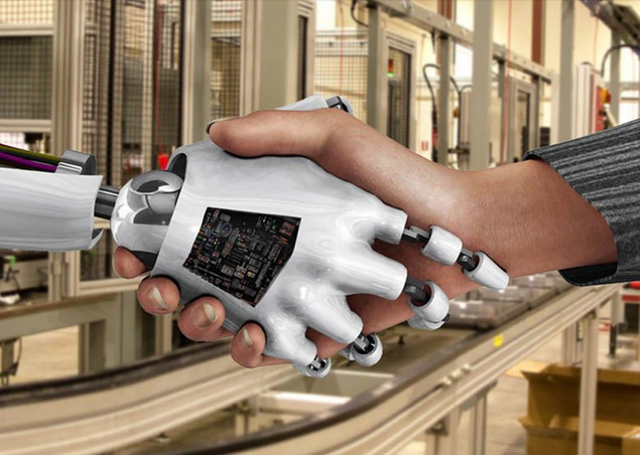
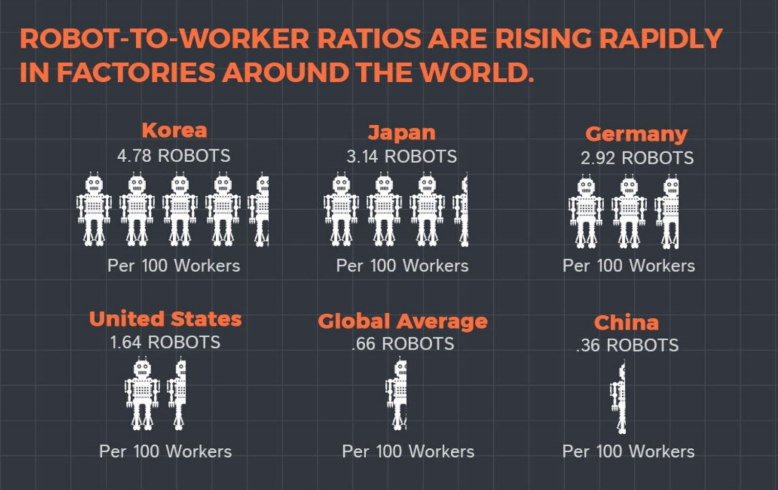
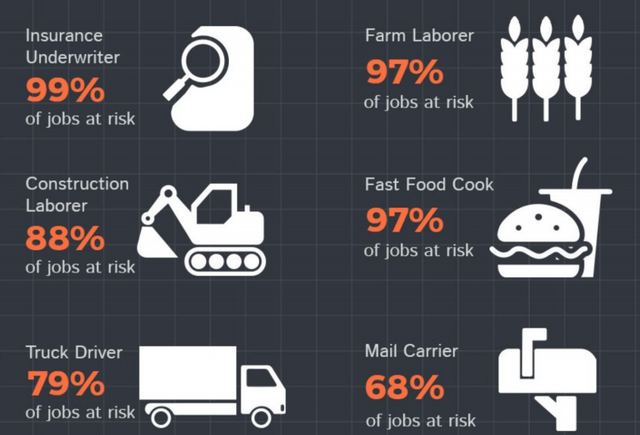
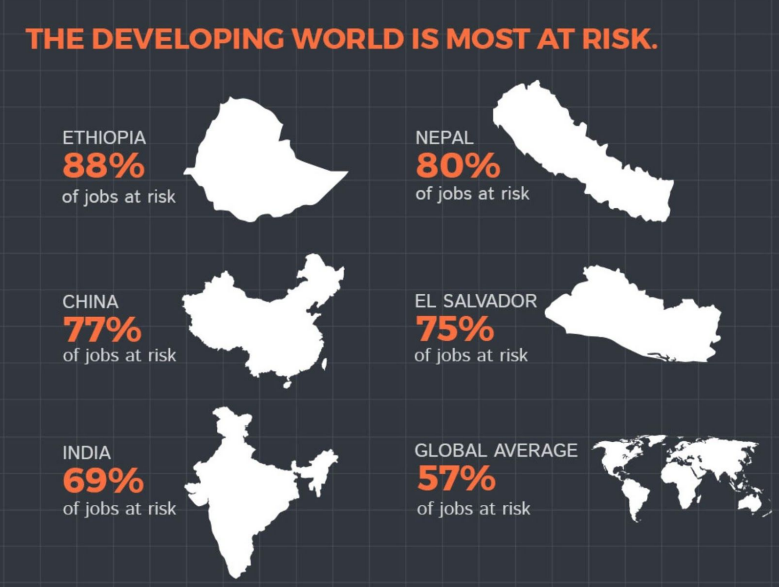
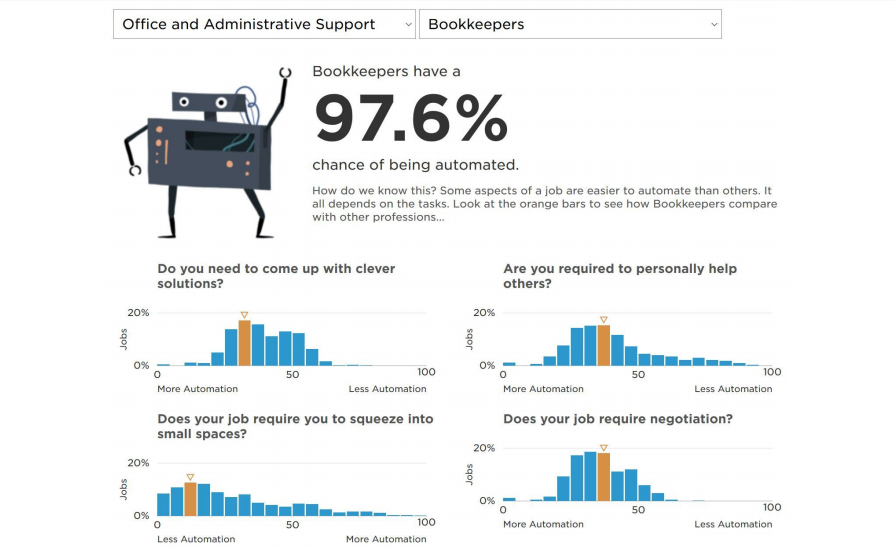
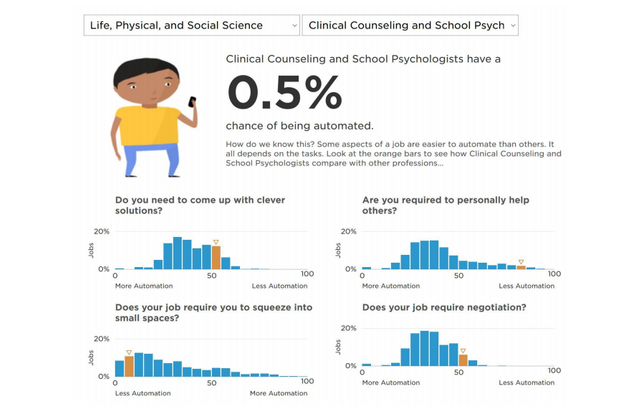

Great post, I wrote something similar with a tool so you can type in your job to find out ;)
If you enjoyed this comment, please Upvote, Resteem and follow me @hotandrandom
I'm glad more people are trying to spread awareness on this. I have written a post too, from the perspective of an Indian citizen. Let me know your thoughts on that! @capital